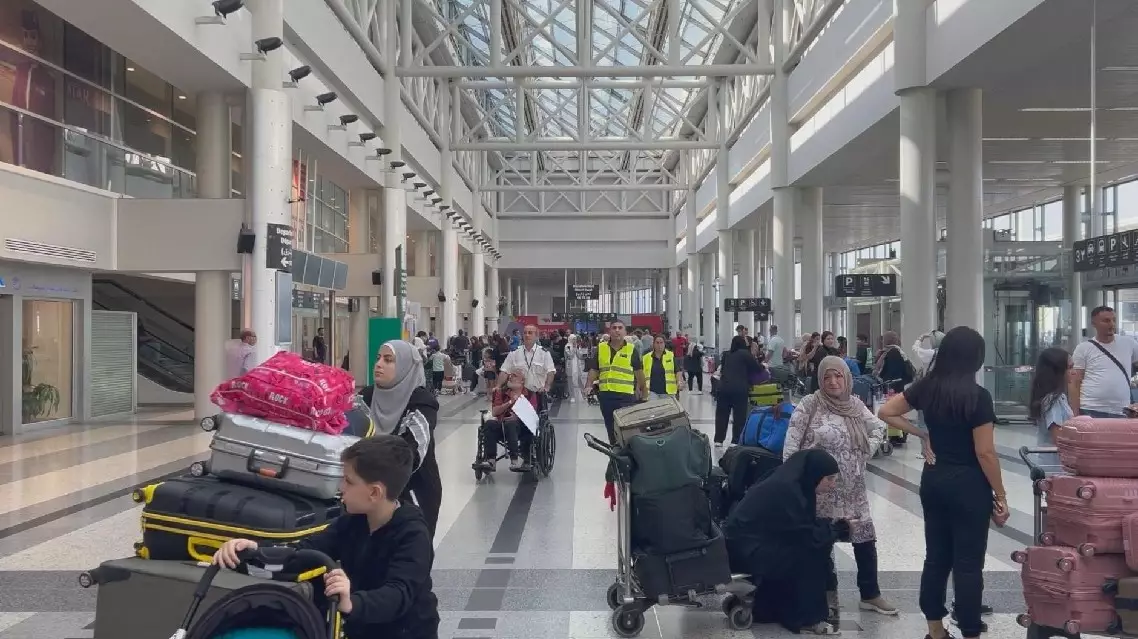China saw a National Day holiday return trip peak on Sunday, with the Ministry of Transport estimating over 282 million cross-regional trips taking place on the sixth day of the country’s “Golden Week.”
The National Day holiday, also known as “golden week,” is usually one of the peak seasons on China’s domestic tourism calendar.
Holidaymakers across the country headed home by train, car and air on the day, with the estimated volume of total trips 6.5 percent up from the same period last year. Railways in particular are expected to handle 18.73 million passengers, with 1,432 additional trains scheduled.
The national railway network has been handling over 17 million passengers for six consecutive days since the holiday travel rush started.
Highways across the country continue to maintain high volumes of traffic, mostly from return trips.
The nation’s capital Beijing saw significant increases of traffic flow entering the city on major highways.
Meanwhile, the country’s civil aviation sector is expected to transport more than 2.34 million passengers on the same day. Airlines within China have handled over 11.4 million passengers in the first five days of the holiday.
Holiday travel enters return peak on day 6 of China’s ‘Golden Week’
Travelers to Lebanon are seeking a quick and secure way out of the country, as Israel ramps up its attacks on Hezbollah. Governments worldwide have also facilitated evacuations, encouraging their citizens to leave before the situation worsens.
Annika finally made it to the airport in Beirut. She was supposed to leave next week, but the conflict between Israel and Hezbollah militants shortened her stay. Now, the only thing on her mind is getting back home.
“It’s horrible. And you have drones flying over your house and things like that. I didn’t feel afraid, but I also have to leave in the future for work, and I don’t know, it’s so insecure. Maybe I don’t want to stay here for another few weeks,” said Annika, a traveler leaving Lebanon.
Although everything seemed calm and far away for the first few days, the scene changed quickly in Beirut. Israeli airstrikes intensified, causing many to flee as fast as they could.
“I’m very worried because you don’t know what can happen from day to day. You’re living like second to second. You don’t know what’s going to happen. And it’s very, very stressful. And this has to come to an end, you know? So, it’s time. It’s time to go,” said Tania, another traveler leaving Lebanon.
The fighting, which has escalated over the past few weeks, has forced the evacuation of thousands of tourists and people with dual citizenship, leaving many scrambling to the airport to secure any available flight in an atmosphere of ongoing strikes. Governments have stepped in to assist with these evacuations, using various channels to reach those who need help.
“We have been using social media a lot to get the message out. [For] our foreign minister, prime minister, and the embassy here in Lebanon, we have been putting out on Twitter, on Facebook, and on Instagram the message that the crisis is here, you need to leave now as soon as possible. And still some don’t get the message. But we’re getting there, because we’ve got a good pick-up today, we’re getting close to 500 people out on two assisted departures to Cyprus today. And we’ll probably continue that for a few days,” said Andrew Barnes, Australian ambassador to Lebanon.
The Netherlands, Belgium, Spain, and Australia have all sent government representatives to Beirut to help people who want to leave or need support. Though the first couple of days were chaotic, as many were fleeing, the evacuation now seems to be proceeding steadily. Although Beirut and its airport are still relatively safe, governments urge their citizens to leave before things worsen.
“We’ve been dealing with this crisis for a while now, and our government has been urging Australians in Lebanon to return home because we were fearful that the situation could escalate. Now it has escalated badly and we are urging all Australians to come to the airport and get on a flight. There are still flights going, the airports still open. They need to leave now because we don’t know how the crisis might escalate,” Barnes said.
Since Sept. 23, the Israeli army has intensified its airstrikes against Hezbollah targets across Lebanon, causing great civilian casualties and forcing residents in many areas to leave their homes. It has also launched what it describes as a “limited” ground operation in Lebanon.
Countries facilitate citizens’ evacuation from Lebanon as fighting intensifies



